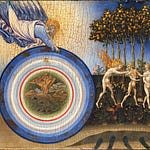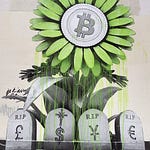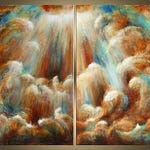*In this multi-part special edition of The Freedom Analects, we will be featuring the excellent written work of author John Vallis titled “Money Messiah: God, Bitcoin, and The Evolution of Consciousness.” This essay beautifully depicts the deeper aspects of value and money, their indispensability to human action, and demonstrates why corrupt money is such a destructive force. John’s original work is available in its entirety here.
My ‘Beliefs’
For what it’s worth, personally, I’ve never ascribed to any particular religion, nor any overly specific notion of ‘god’. I see great wisdom in a variety of religions, myths and stories, and believe that very similar fundamental themes sit at the foundation of many of them. This, however, seems to me to invalidate a monopoly claim on ‘truth’ by any one in particular, though their degree of relative sophistication may indeed be extremely consequential.
Of course, this doesn’t mean I haven’t been influenced by certain of them more than others, in both conscious and unconscious ways. Culture is tremendously influential in determining how we think and act, and as the religious stories have had an enormous impact on the character of most cultures, I doubt it’s possible to be completely impervious to their influence (nor is such a thing necessarily even desirable).
In any case, I’ve come to have a deep appreciation for the contributions that all formal religions have made to both our understanding of the most fundamental components of reality, and, despite their many shortcomings, their contributions to culture and human flourishing.
In a world in which various competing or conflicting factions have access to weapons of mass destruction, it seems like a hell of a time to give up on the enterprise of determining how best to engage the reality we all share.
The world appears to be in a precarious position, and though many do their best to confront it nobly, many also seem to share a sense that something is fundamentally wrong, and that the outcome will be extremely dire, if a proper solution is not discovered, or revealed, soon.
It is from this circumstance (and possibly because of it) that out of the unconscious of a single individual, a counter-force has emerged, to save humanity from itself, possibly just in time.
I believe that force is bitcoin.
Maps of Meaning
Someone who has been highly influential in opening my mind to an alternative, or perhaps more sophisticated, understanding of religious thought and narrative, is Jordan Peterson.
My interest in Peterson’s lectures led to my reading of a book he published in 1998, entitled ‘Maps of Meaning’.
*Ledn has recently launched a Bitcoin-based home mortgage product. Now you can buy your dream home without selling your Bitcoin!
Sign up with Ledn to get started today: https://mortgage.ledn.io/
This book was written long before Peterson’s rise to international notoriety, and therefore up until recently, was quite obscure.
I’d been listening to many of Peterson’s lectures, and had heard him reference the book and the material it contained many times. I was particularly intrigued by how much time he claims to have spent writing it, about 15–20 years if I remember correctly, isolating and re-writing each sentence 10 (or more) times to make sure it represented, as precisely as possible, the meaning he was attempting to convey. It’s almost hard to believe someone could tolerate that level of persistence and meticulousness, especially with the ever-looming questions of; ‘What if I’m not seeing this clearly?’, ‘What if nobody reads this?’ (and relatively few did for almost two decades), ‘How can I possibly justify the time I’m spending on this when I have work, family, health, friends etc to attend to?’. The only answer that I can muster, and the obvious one, is that he thought it to be ‘worthwhile’.
I suspect he believed that what he was attempting to communicate was a profound truth, and for that reason, he had to make sure it was articulated clearly, no matter the cost. It’s a staggering sacrifice really, a dedication and discipline that relatively few people will probably ever be sufficiently motivated to endure. In any case, knowing his material, and his approach to writing the book, I assumed it would not only be extremely enjoyable, but also profound — I was right.
Though I’ve chewed on some of the ‘big questions’, and attempted to integrate whatever insights that’ve come from doing so, my perception of the ‘ground of being’, the setting for these cosmic dramas we call our lives, and it’s influence, was lacking a kind of coherence, and I’ve found Peterson’s framework (and that of others since) to fill that void, if only temporarily, quite nicely.
So what IS that framework which I found so useful? Well, let me just distill a 460 page book and 20 years of thought and research into a paragraph or two, shall I? lol. (Forgive me, Jordan)
Essentially, Peterson treats the relevant, in fact primary, plane on which to ask the big questions about reality as that of ‘meaning’, rather than ‘matter’. He makes the case that such is how human beings experience the world, unavoidably, and that this is sewn into the very fabric of our being.
Things aren’t just things, they’re (moreso) potentials for action and experience.
Peterson:
“What a thing IS is most fundamentally its motivational significance — its relevance for the attainment of some affectively significant goal.”
However you might characterize human beings, the unavoidable fact is that we were shaped by ‘nature’. Not just the conditions of the ‘natural world’ per se, but all the seen and unseen forces that act upon us in conscious and subconscious ways, now, as well as on and in the very primitives of early life — we’re all shaped by the ‘structure of reality’, as it were.
*Join me at the biggest event of the year, Bitcoin 2022. See below for 10% discount on tickets*
“Bitcoin 2022 Conference is the biggest gathering of the Bitcoin ecosystem in the world. Join me and the movers and shakers shaping the Bitcoin future next April 6-9th in Miami Florida for Bitcoin 2022 Conference.”
Paying with Fiat? 10% Affiliate link: http://tixr.com/pr/robertbreedlove/26217
Paying with Bitcoin? Use promo code: BREEDLOVE.
We may never know the ‘absolute truth’ of the reality in which we exist (perception, necessitating limitation, seemingly negates the possibility of beholding ‘all that is’), but we might be able to understand and engage the more relevant truth, which is the nature of the reality we experience, and how best to mediate the forces that comprise it, in order to construct a maximally meaningful — or worthwhile — life.
Peterson, building on the works of other great thinkers, conceptually identifies these fundamental forces, which permit, shape, and guide human experience, as Chaos and Order.
Chaos is symbolically represented by entropy, the unknown, darkness, unexplored territory, feminine, night, moon, yin etc. Order, by negentropy, the known, light, explored territory, masculine, day, sun, yang etc. One is not better than the other, nor is one positive and the other negative. They both have their positive (generative) and negative (destructive) aspects, and each serves to balance the other (under ideal circumstances).
This dynamic forms the basis of how we experience reality, and is represented on, and communicated through, every scale of existence, from the cosmic, to culture, to the structure of consciousness. According to Peterson, our minds are evolved to see, and respond-to, the world through this framework. Of course, this begs the question, if true, what is the optimal way to engage it?
To answer this question, Peterson delves into the relevant domains of ‘formal’ sciences (psychology, biology, neuroscience etc), but also, necessarily, into the ‘spiritual’ or ‘religious’ domains.
Throughout the book, he draws on a broad array of religious narrative and iconography, to showcase the consistent prevalence of the chaos/order dynamic, explain its meaning, and explore the questions which it inherently poses.
Peterson:
“Mythic truth is information, derived from past experience — derived from past observation of behaviour — relevant from the perspective of fundamental motivation and affect. Mythic drama, which plays out the exploits of exceptional individuals, appears devoted toward explication of a generally applicable pattern of adaptation. This archetypal model serves to aid in the generation of all situation-specific individual behaviours.”
In Part 3, John will continue to explore the connections between Peterson’s “Maps of Meaning” and how humans orient themselves in the world using systems of value…
Thank you for reading Money Messiah (Part 2).
PODCAST
SOCIAL
SUPPORT
Send Bitcoin to my PayNymID: +tightking693
RECOMMENDED BUSINESSES
Automatically buy and withdraw Bitcoin ($10 in free Bitcoin here)
Join Me at the Bitcoin 2022 Conference in Miami, FL (Code: BREEDLOVE)
Home Delivered Organic Grass-Fed Beef (Discount Code: BREEDLOVE22)
Bitcoin-based home mortgages with Ledn: A better home for your Bitcoin
If you’ve found my work to be valuable, please join our private telegram group:


















Money Messiah (Part 2)